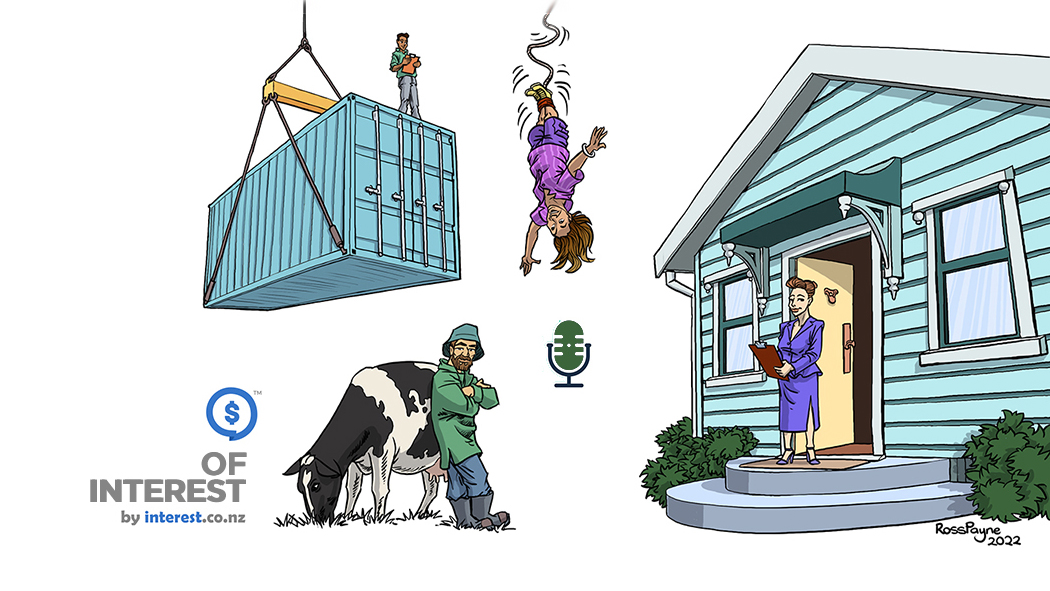
By Gareth Vaughan
With a United States presidential election looming in November, Patrick Watson, Senior Economic Analyst at Mauldin Economics, says it's difficult to say what the key economic battleground will be because many voters are "living in their own realities."
Speaking in a new episode of interest.co.nz's Of Interest podcast, Watson says there's not a great deal of agreement on whether the US economy is even in good or bad shape.
"If you ask Democrats, they mostly say the economy is fantastic. If you ask Republicans, they say the economy is terrible. I think it's somewhere in between. I think that's what the data actually shows," Watson says.
The election is expected to be a rematch between incumbent Democrat Joe Biden, and his Republican predecessor Donald Trump.
"On the Trump side, they have not really announced a great deal of specific policy. So that's kind of a mystery. We know what the Biden administration has done and says they will do. People can like it or not like it, but they at least know. So what we do know from the Republican Trump side is he wants to further restrict immigration. He will probably resume the various trade war and tariff measures that he was doing last time and possibly more aggressively," Watson says.
"But again, the difficulty is people aren't operating from reality. People are operating from their own predispositions, what they think is happening. So that makes it hard to predict."
Asked whether the average American is feeling as if they're doing well at the moment, Watson says this is a really interesting question.
"The survey data that's out there is really confusing, because when they ask people, how is your situation, how are you doing financially in your own family and household? Most people, pretty solid majorities, over 60% are saying, 'I'm great, I'm in a good spot.' But then if you ask them how do you think the economy is doing overall for everyone else, they become very bearish. They think it's terrible. So it's hard to see how both of those are true at the same time," says Watson.
In the podcast Watson also talks about this week's Federal Open Market Committee (FOMC) monetary policy review and the outlook for US interest rate cuts, the US inflation picture including housing's role in its stickiness, what's going on in US share markets, regional economic performance in the US, challenges in the US labour market, and the influence of the Inflation Reduction Act.
*You can find all episodes of the Of Interest podcast here.

10 Comments
I think what’s often lost on economists and politicians is that consumers aren’t looking at todays prices verse last years, but todays prices verse 2-3 years ago, and they are seeing a +20% increase in consumer goods/staples.
It’s hard to argue the economy is “great” when the effects of historic inflationary pressures are still being felt, then there is the “Once burnt twice shy” saying to consider, no mainstream politician or economist in 2021 was thinking inflation was going to be an issue in 2022/23, but they were all wrong, so the public is right to mistrust the messaging that things are going “great” currently.
Hell, in mid 2008 the public was still being told by politicians/FED/etc. the economy was great, only to be told 3 months later that they’ve been in the worst recession since the great depression.
I wouldn’t trust the polls they’re referring to as much as I’d trust the economic projections were being fed either.
More or less then, the typical American voter will vote either slavishly for either Republican or Democrat as an entrenched loyalist or simply on the basis of “what’s in it for me,” and of course, the former largely colours the latter. Not much of JFK’s famous “ask not” speech in play these days, afraid to say.
Many people do not like to admit their own situation is fragile so report they are fine whilst quietly planning for any future mishaps they see and protect themselves as best they can. NZ last election demonstrated how angry they really were whilst telling pollsters what pollsters preferred to hear.
"He (Trump) will probably resume the various trade war and tariff measures that he was doing last time and possibly more aggressively,""
This begs the question. Did Biden ever lift the Aluminium an steel? tariff that Trump imposed on NZ? If not so much for slavishly following the US in other matters.
I'm sure the NZ branch of MAGA will still be cheering, even as Trump shafts us.
I see the primary issue being that people are either disengaged from the greater economical picture and/or not getting impartial information. Many either only watch one news stream or take what is put on social media as gospel which, as has been proven, is ridiculous given the algorithmic propensity for social media to polarise people further and further over time with use.
If everyone had the same news that was delivered impartially and was engaged with by the majority of citizens, then they would have a different outcome without doubt.
Most do not understand finance and credit creation by fractional reserve banking. Most staff inside a bank don't understand these things either, it's reserved for the financial markets, treasury and institutional banking crowd.
If you do not understand how the current system works its hard to position yourself to benefit from it, or suggest possible changes.
In NZ there is only one main game..... Capital gains through land speculation (commercial, residential or agricultural land.)
When Govt legislates regulations that individuals do not like/agree with or they see as unworkable they find alternatives preferably ones that minimise taxation. Taxation is seen as simply money for Govt to waste. Instead of increasingly passing such legislation if Govt incentivised work and innovation by removing obstructionist legislation and Bureacrats in time NZers would do what they have laways done best, create solution and products to solve problems that other NZers consider valuable by purchasing, it may even improve NZ productivity and GDP.
A reality where Trump won the last election, the Clintons are running paedophile rings from a pizza parlour, murderous dictators are admirable smart guys, where the Covid epidemic is a Democratic hoax and where anybody who criticizes Trump is a radical left wing lunatic(no radical right wing lunatics around thee ever), where every conspiracy theory is obviously fact and where facts don't matter..........
The differecne between conspiracy theories and fact is often about six months. I recall Ardern spewing from the Podium of lies how effective the Covid vax was, now we know differently.

We welcome your comments below. If you are not already registered, please register to comment
Remember we welcome robust, respectful and insightful debate. We don't welcome abusive or defamatory comments and will de-register those repeatedly making such comments. Our current comment policy is here.